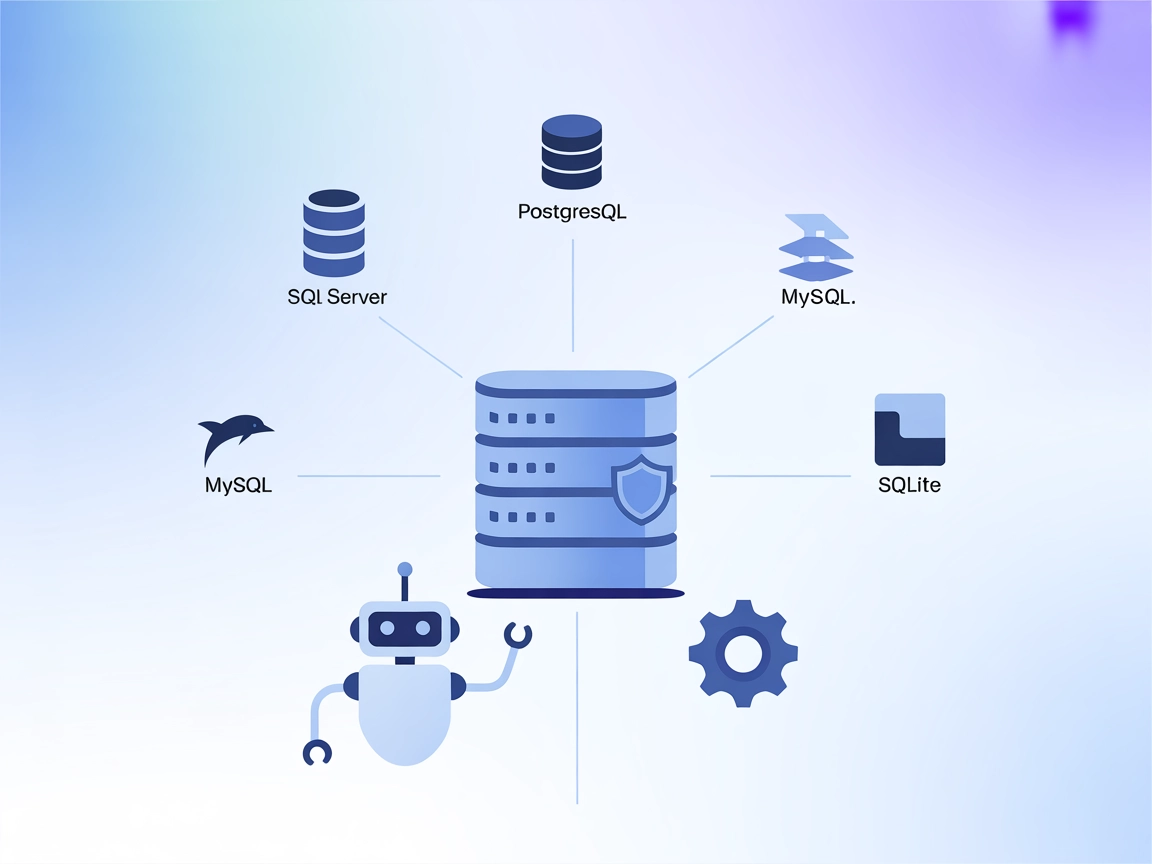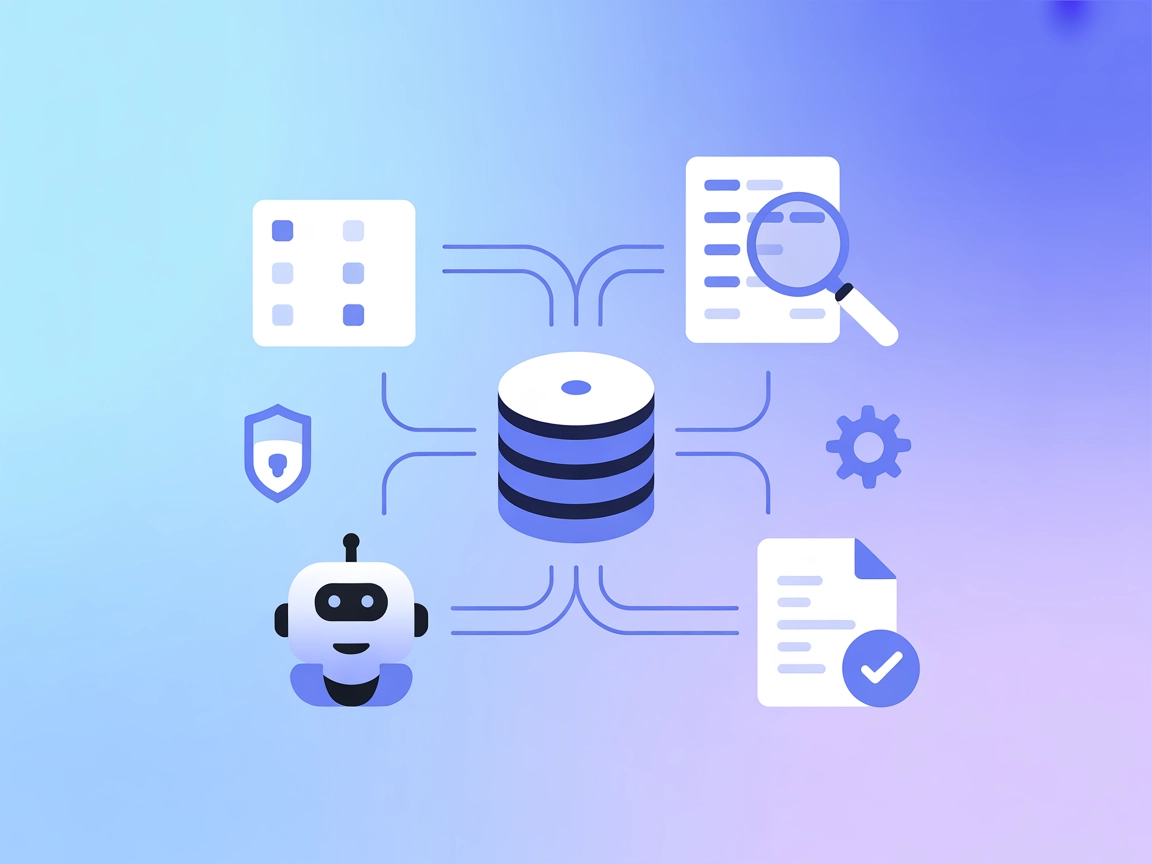
JDBC MCP Server Integration
The JDBC MCP Server bridges AI assistants and SQL databases using the JDBC protocol, enabling real-time queries, analytics automation, and streamlined database ...

Bridge your AI agents and SQL databases effortlessly with the JDBC MCP Server, enabling secure, automated, and multi-database workflows in FlowHunt.
FlowHunt provides an additional security layer between your internal systems and AI tools, giving you granular control over which tools are accessible from your MCP servers. MCP servers hosted in our infrastructure can be seamlessly integrated with FlowHunt's chatbot as well as popular AI platforms like ChatGPT, Claude, and various AI editors.
The JDBC MCP Server is a Model Context Protocol (MCP) server designed to act as a bridge between AI assistants and relational databases via the JDBC (Java Database Connectivity) standard. By leveraging this server, developers can empower AI agents to execute database operations, retrieve and manipulate data, and interact with multiple types of SQL databases seamlessly. This capability enhances workflows by enabling tasks such as running queries, performing analytics, and managing data directly through AI-driven interfaces. The JDBC MCP Server simplifies access to disparate databases, making it easier to integrate database-backed functionalities into development and automation pipelines.
No prompt templates were found or mentioned in the repository.
No explicit resources are detailed in the available documentation or files.
No explicit list of tools could be found in server.py or related files within the repository.
windsurf.config.json).mcpServers object using the following snippet:{
"mcpServers": {
"jdbc-mcp": {
"command": "npx",
"args": ["@jdbc/mcp-server@latest"]
}
}
}
claude.config.json).{
"mcpServers": {
"jdbc-mcp": {
"command": "npx",
"args": ["@jdbc/mcp-server@latest"]
}
}
}
cursor.config.json.{
"mcpServers": {
"jdbc-mcp": {
"command": "npx",
"args": ["@jdbc/mcp-server@latest"]
}
}
}
cline.config.json.{
"mcpServers": {
"jdbc-mcp": {
"command": "npx",
"args": ["@jdbc/mcp-server@latest"]
}
}
}
To secure sensitive information like database credentials, use environment variables in your configuration. Example:
{
"mcpServers": {
"jdbc-mcp": {
"command": "npx",
"args": ["@jdbc/mcp-server@latest"],
"env": {
"JDBC_URL": "${JDBC_URL}",
"JDBC_USER": "${JDBC_USER}",
"JDBC_PASSWORD": "${JDBC_PASSWORD}"
},
"inputs": {
"jdbc_url": "${JDBC_URL}",
"jdbc_user": "${JDBC_USER}",
"jdbc_password": "${JDBC_PASSWORD}"
}
}
}
}
Using MCP in FlowHunt
To integrate MCP servers into your FlowHunt workflow, start by adding the MCP component to your flow and connecting it to your AI agent:

Click on the MCP component to open the configuration panel. In the system MCP configuration section, insert your MCP server details using this JSON format:
{
"jdbc-mcp": {
"transport": "streamable_http",
"url": "https://yourmcpserver.example/pathtothemcp/url"
}
}
Once configured, the AI agent is now able to use this MCP as a tool with access to all its functions and capabilities. Remember to change “jdbc-mcp” to whatever the actual name of your MCP server is and replace the URL with your own MCP server URL.
| Section | Availability | Details/Notes |
|---|---|---|
| Overview | ✅ | |
| List of Prompts | ⛔ | No prompts found |
| List of Resources | ⛔ | Not specified |
| List of Tools | ⛔ | Not specified |
| Securing API Keys | ✅ | Example provided |
| Sampling Support (less important in evaluation) | ⛔ | Not mentioned |
A solid JDBC MCP implementation with clear setup instructions and security best practices, but missing explicit prompt, resource, and tool definitions. Based on the above, I’d rate this MCP server a 4/10 for documentation and usability.
| Has a LICENSE | ⛔ |
|---|---|
| Has at least one tool | ⛔ |
| Number of Forks | |
| Number of Stars |
The JDBC MCP Server is a bridge between AI assistants and relational databases using the JDBC standard, enabling AI agents to run SQL queries, manage records, and automate reporting across multiple database types.
Add the MCP component to your flow, open its configuration panel, and insert your JDBC MCP server details in the system MCP configuration section. Use the provided JSON format to connect your server.
Use environment variables in your MCP server configuration to securely store sensitive information like JDBC URLs, usernames, and passwords. Refer to the example in the documentation for proper setup.
You can connect to any SQL database supported by JDBC, such as MySQL, PostgreSQL, Oracle, SQL Server, and more.
Common use cases include executing database queries, managing and updating data, integrating multiple databases, automating data reporting, and providing secure data access for AI agents.
Empower your AI agents to interact with any JDBC-compatible database. Run queries, manage records, and automate reporting—all within your FlowHunt workflows.

The JDBC MCP Server bridges AI assistants and SQL databases using the JDBC protocol, enabling real-time queries, analytics automation, and streamlined database ...

The MCP Database Server enables secure, programmatic access to popular databases like SQLite, SQL Server, PostgreSQL, and MySQL for AI assistants and automation...

The MySQL MCP Server provides a secure bridge between AI assistants and MySQL databases. It enables structured database exploration, querying, and data analysis...
Cookie Consent
We use cookies to enhance your browsing experience and analyze our traffic. See our privacy policy.